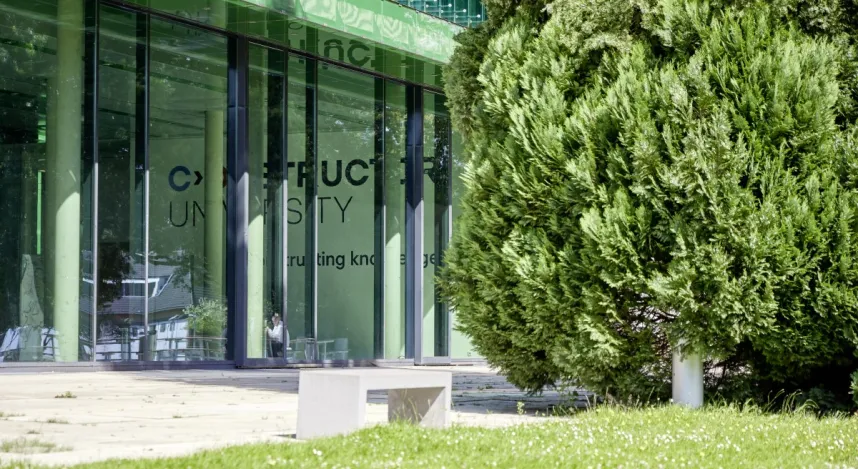“Constructive for Bremen” – Constructor University students pitch Community Impact Projects at Haus der Wissenschaft
Get off campus and get out into the community! As part of their studies at Constructor University in Bremen students conceived, developed and presented Community Impact Projects (CIPs)—where students apply aspects of their studies to address practical, social problems. In this way, they not only learn how to put their knowledge into practice, but also make a meaningful contribution to the Bremen community. As part of the “CIP Pitch Night” at the Haus der Wissenschaft, seven teams presented their ideas to an audience of around 200 attendees—from using AI to monitor brain activities in martial arts fighters to a historical city experience with the support of augmented reality.
“We are members, or at least temporary members, of the greater Bremen community,” said Alec Bohman, International Relations student at Constructor University from Chicago, IL. and presenter of the “Overbeck Museum” project. “We should be taking an interest in the local cultural institutions and giving back to the community—that’s what Community Impact Projects are all about." The night’s big winner wasn’t Overbeck Museum, however. That distinction went to “Bicycle Workshop,” a project whose participants repair used bicycles to make a contribution to sustainability and simultaneously develop some practical skills. Furthermore, Bicycle Workshop provides much-needed assistance to refugees by giving them bicycles or repairing theirs free of charge. "Bicycle Workshop" won the public vote and took home the first-place prize.
For the projects themselves, students could let their imaginations run wild. They had the freedom to pursue personal interests in previously established initiatives or could create new projects from scratch—provided that they meet a trio of conditions. First, the project had to be related to their major, second it must respond to a social need and third projects needed to be conducted in cooperation with a local organization. Students then are then required to invest at least 125 hours to their chosen charitable cause. At the CIP Pitch Night, the presentations not only presented the ideas at the heart of each project, but also served an educational purpose, emphasized Dr. Jakob Fruchtmann, initiator of the Community Impact Projects and lecturer at Constructor University, in his welcoming remarks to open the evening. “You all have outstanding academic abilities. However, if you are not able to persuasively articulate your ideas to the public, no one will truly appreciate what you do.”
In addition to Bicycle Workshop, six other teams presented their projects. “Brain Battle” is taking on cognitive activity in martial arts practitioners, using artificial intelligence to monitor and optimize their performance. “Robokids” is also seeking to leverage technology to make an impact; the project aims to give young people access to robotics labs in order to improve education in STEM subjects.
Another area of focus was on sustainability and climate change: “Urban Pergola” is committed to greenifying our city centers by developing new planting methods to counteract climate change. The W.Orchid project is taking on a similarly lofty goal. “It is estimated that average temperatures in Bremen will rise by 3.6 degrees within the next century, which will expose the city to extreme heat and increase the risk of flooding. W.Orchid aims to provide Bremen buildings with panels that are highly absorbent of liquids and have a cooling effect at the same time,” explains Malak Essarhir, recipient of this year's Ronny Wells Scholarship for students with outstanding entrepreneurial achievements. The team is currently trying to raise funds for a working prototype.
Rounding out this year’s Community Impact Projects was “Ghosts of History,” which is taking lesser-known historical events from the surrounding region and bringing them to life. Since the spring of 2024, the “Ghosts of History” team has been developing an app for Android that harnesses augmented reality to save the tiny, intimate histories that make cities unique.
The CIP Pitch Night was supported by the Wolfgang Ritter Foundation Bremen, which promotes scientific institutions and young scientists. This year, the foundation donated €1500 in prize money to presenting projects. The event took place at Haus der Wissenschaft, a non-profit organization designed to establish understanding and appreciation towards science to the broader community in and around Bremen.
Questions answered by:
Dr. Jakob Fruchtmann | Sociology, School of Business, Social & Decision Sciences
jfruchtmann@constructor.university
